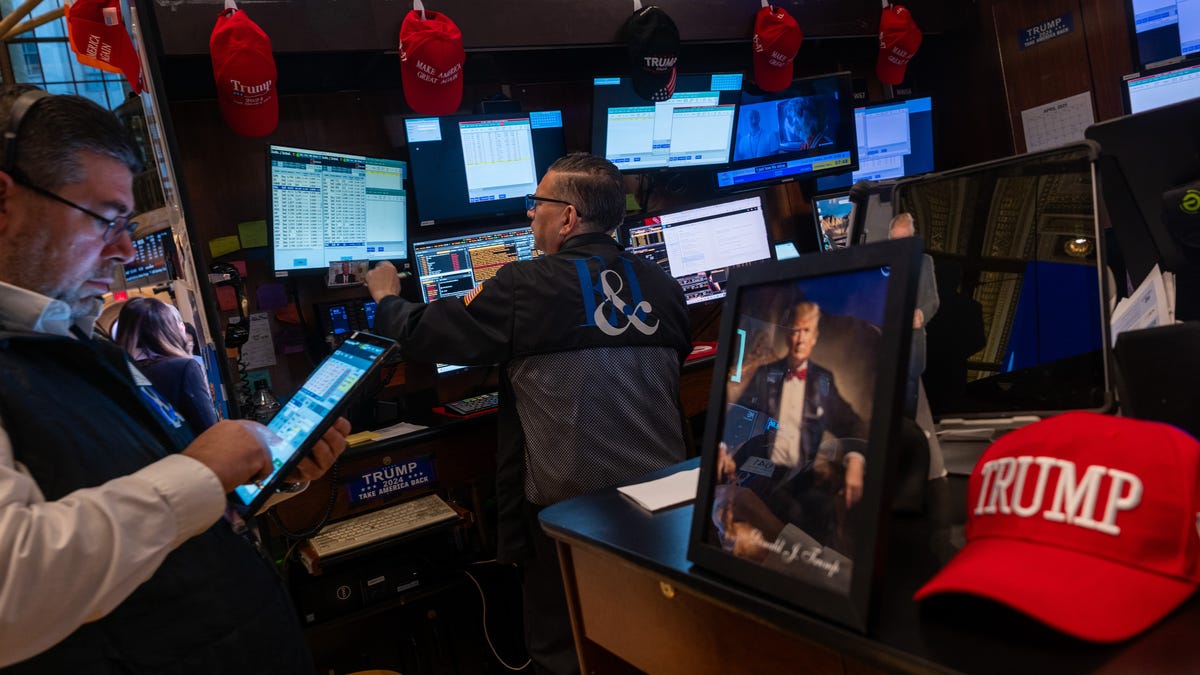Americans react to trade war developments
Americans are reacting to a 90-day pause on global reciprocal tariffs for some countries, and a boost on China’s levy.
The European Union put on hold for 90 days its first countermeasures against U.S. tariffs amid signs the global trade war sparked by President Donald Trump might be easing.
The decision came following Trump’s announcement of a 90-day pause on U.S. levies for scores of nations that did not retaliate against the tariffs Trump unveiled last week. The pause sent U.S. stocks soaring Wednesday, and global stocks followed suit Thursday.
“We took note of the announcement by President Trump,” European Commission President Ursula von der Leyen said in a social media post Thursday. “We want to give negotiations a chance.”
The trade clash with China, however, appeared to be ramping up. Trump on Wednesday raised the tariff on Chinese goods once again, to 125%. China’s 84% tariff on U.S. goods kicked in Thursday.
“At some point, hopefully in the near future, China will realize that the days of ripping off the U.S.A., and other Countries, is no longer sustainable or acceptable,” Trump wrote on Truth Social.
What the Trump administration means for your wallet: Sign up for USA TODAY’s Daily Money newsletter.
U.S. stock futures pointed to a lower open Thursday, a day after the domestic markets saw a historic surge on President Donald Trump’s 90-day pause on some of his most aggressive tariffs.
“The current situation is not only chaotic, it’s crazy,” said ING Economist Carsten Brzeski. “Don’t forget that we have been here before with announcements and then we get some pauses, only for the originally announced tariff to be reintroduced again.
On Wednesday, stocks surged, pushing up the S&P 500 more than 9% for its third-largest gain in a single day since World War II. The Dow posted its biggest percentage advance since March 2020, while the Nasdaq scored its biggest one-day gain since January 2001 and second-best day on record. About 30 billion shares changed hands, which was the highest in at least 18 years.
− Medora Lee
The three-month tariffs suspension announced Wednesday marks a dramatic retreat for Trump, who on Monday said he wasn’t interested in a pause and just hours before Wednesday’s announcement urged Americans to “BE COOL!” in a post on social media.
Treasury Secretary Scott Bessent, explaining the sudden shift, told reporters the Trump administration has been “overwhelmed” by the more than 75 countries that have approached the U.S. seeking trade deals after the president first announced the sweeping tariffs last week.
“We are expecting them to come with their best deals,” Bessent said. “As I said a week ago today, don’t retaliate, hold your ground, let’s see what happens. And China, they have kept escalating and escalating, and now they have 125% tariffs.”
Bessent credited Trump for creating “maximum negotiating leverage” to bring much of the world to the negotiating table while China sits out.
Of the $3.2 trillion the U.S. imported in 2022, 16.5% of that came from China, making it America’s top supplier, according to the Office of the U.S. Trade Representative. China is also one of the USA’s top export destinations, falling behind Canada and Mexico with $150.4 billion of U.S. goods being bought by China in the same year.
Mechanical appliances, sound recorders and TV sets were the most commonly traded commodity sectors between China and the U.S. in 2022, according to a U.S. Department of Commerce Office of Industry and Security report. For the average consumer, some everyday goods are likely to get more expensive. Read more about what those items are.
− Kinsey Crowley
Michigan Gov. Gretchen Whitmer, a potential presidential contender for Democrats in 2028, called for a tariff exemption for autos and energy. Whitmer, in Washington for a meeting with Trump, made the pitch during a speech Wednesday on manufacturing policy.
“Let’s carve out autos and energy, both of which are critical to manufacturers and directly impact people’s wallets,” she said.
Whitmer bashed Trump’s tariff threats in February but has been more muted in recent weeks, even as Trump announced 25% import taxes on foreign vehicles and widespread “reciprocal tariffs” on most other goods from around the world. Whitmer told journalist Gretchen Carlson that bipartisanship was crucial and that she was meeting with Trump and his team to protect the interests of her state.
“If you’re not at the table, you’re on the menu,” she said.
− Grant Schwab, The Detroit News
Correction territory is generally understood to mean a stock market indicator has dropped at least 10% from its recent market high. This is different from bear market territory, which refers to a stock market drop of 20% or more from a recent peak, or a closing high.
Every investment is susceptible to corrections. They can apply to individual stocks, bonds, or stock indexes such as the Dow, S&P 500, and Nasdaq.
Several things can prompt a correction including a change in economic policy, newly released jobs or inflation data and company earnings reports.
− Rachel Barber
A recession is informally considered at least two straight quarters of declining economic output. But the technical definition is “a significant decline in economic activity that is spread across the economy and lasts more than a few months,” according to the nonprofit National Bureau of Economic Research.
The measure is based on employment, income, consumer spending and industrial production, among other criteria. An economic tailspin is typically accompanied by hundreds of thousands or millions of net job losses.
